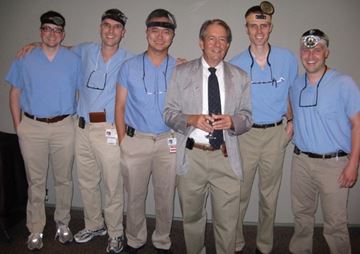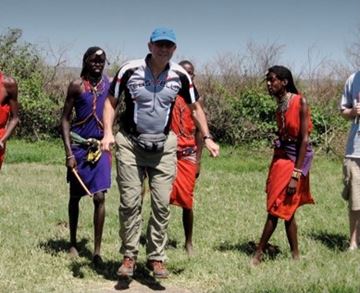Now more than a decade has passed since Weisberger retired from his 32-year career with the Department of Otolaryngology—Head and Neck Surgery at Indiana University School of Medicine, and his dedication to patients, colleagues and trainees did not go unnoticed.
Thanks to the generosity of donors, the department established the Edward C. Weisberger Fellowship in Head and Neck Oncology and Reconstructive Surgery and Lectureship. The endowed lectureship, which had its inaugural seminar in fall 2022, enables the department to bring prominent physicians to campus to share their expertise in head and neck surgery.
Weisberger said having a fellowship and lectureship named after him is a great honor.
“There is nothing more rewarding than to be a teacher and know your students and those you taught really appreciated the interaction, and that you made a change in their lives,” he said.
 At the lecture in November 2022, Weisberger caught up with past residents and faculty, eagerly asking them about what they’ve accomplished in their careers, he said. The keynote speaker was William Kuhel, MD, who completed his residency with the department in 1988, when Weisberger was nearing his 10th year at IU School of Medicine. Kuhel is now a professor of otolaryngology—head and neck surgery at Weill Cornell Medical College in New York City.
At the lecture in November 2022, Weisberger caught up with past residents and faculty, eagerly asking them about what they’ve accomplished in their careers, he said. The keynote speaker was William Kuhel, MD, who completed his residency with the department in 1988, when Weisberger was nearing his 10th year at IU School of Medicine. Kuhel is now a professor of otolaryngology—head and neck surgery at Weill Cornell Medical College in New York City.
The inaugural Weisberger Lectureship took place the same day as the department’s Lingeman Lectureship, in honor of the late Raleigh Lingeman, MD, who served as department chair from 1971-1987. Weisberger joined the department in 1979, and he admired Lingeman’s leadership.
Tom McSoley, MD, otolaryngology resident from 1978-1983, said both Lingeman and Weisberger emphasized the importance of patient care.
“Their patients were really their patients,” McSoley said. “They weren’t just physicians who came in and out of the medical center.”
Mark Royer, MD, MBA, otolaryngology resident from 2007-2012, said he continually remembers the lessons learned from Weisberger.

“He demonstrated to us the importance of taking personal responsibility to provide the highest quality care to our patients in every situation,” Royer said. “It’s a check on what I still do now—what would Dr. Weisberger do in this situation?”
When Michael Moore, MD, the Arilla Spence DeVault Professor of Otolaryngology—Head and Neck Surgery, joined the department faculty in 2008, he not only partnered with Weisberger on head and neck oncology but also the creation of a new head and neck reconstruction program.
“I always admired how he got to know every patient as a person,” Moore said. “He let me know not to be afraid of that—just be a person and see them as a person and see how you can play a part in their care and help them walk the right path for them.”
Moore said Weisberger always had the mindset of doing the right thing and putting the needs of a patient’s wellbeing at the forefront of his work.
Phil Gardner, MD, resident from 1991-1996, agreed.
“He cared about his patients first and foremost, but he also cared about you, and you felt that,” Gardner said. “He did it with this quiet authority. He has a pulse that never changed–in the OR on long cases, he was just one of those people who you wanted to emulate.”

Near the end of Weisberger’s career at IU, he traveled to Eldoret, Kenya through the department’s collaboration with AMPATH —a partnership between Moi University, Moi Teaching and Referral Hospital and the AMPATH Consortium of North American universities, led by IU.
Weisberger said he appreciated the humbleness and gratefulness of patients in Kenya who he treated. Department faculty and trainees continue to travel to Kenya to offer an ear, nose and throat (ENT) camp at the hospital. Moore and Akash Naik, MD, the first head and neck fellow named in Weisberger’s honor, spent a few weeks of October 2022 at the Eldoret hospital.
Outside of the operating room and clinic, McSoley said Weisberger played racquetball and ran 10Ks and triathlons with residents. McSoley knew Weisberger’s family and had dinner at their home. Royer added that Weisberger once loaned him his bicycle, a passion of Weisberger, which Royer later adopted.
“We admired him not just for his clinical care and surgical acumen,” Royer said, “but his outside interests as well. He was a source of encouragement and inspiration to me and other residents to pursue outdoor activities, travel and humanitarian surgical trips.”
